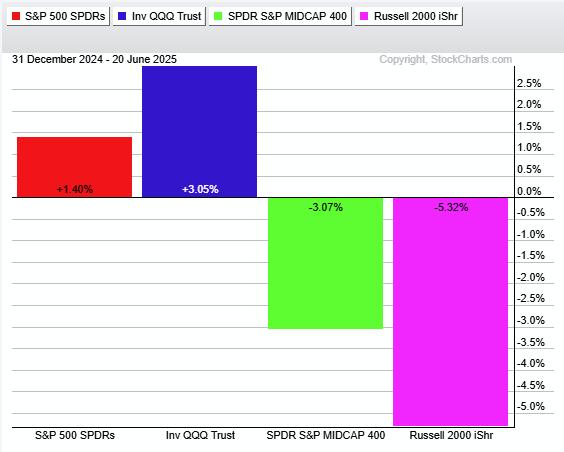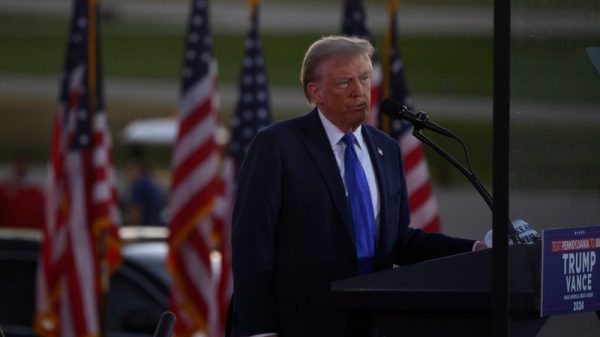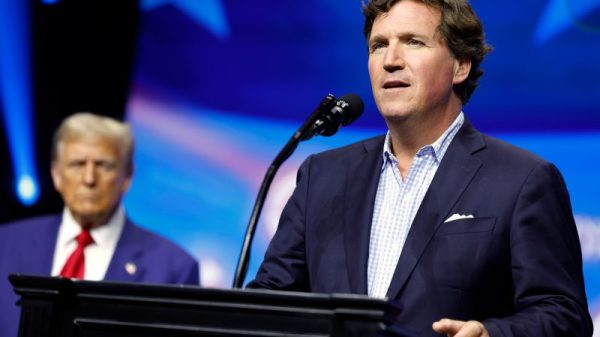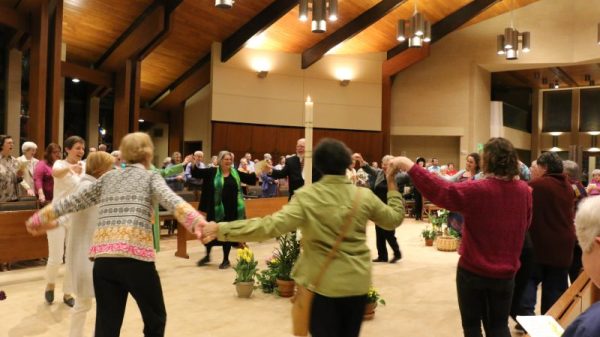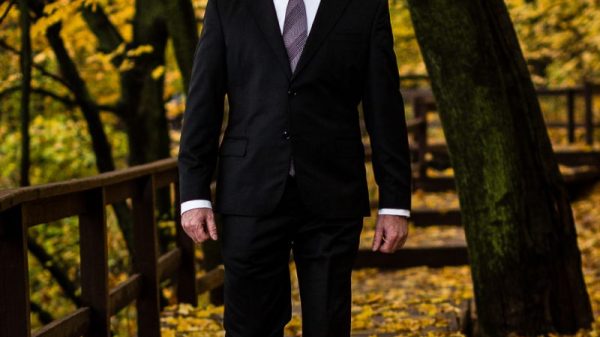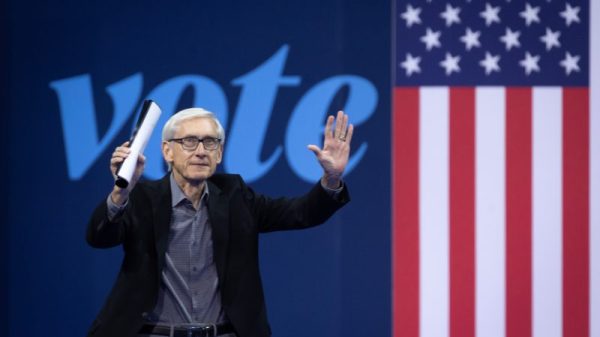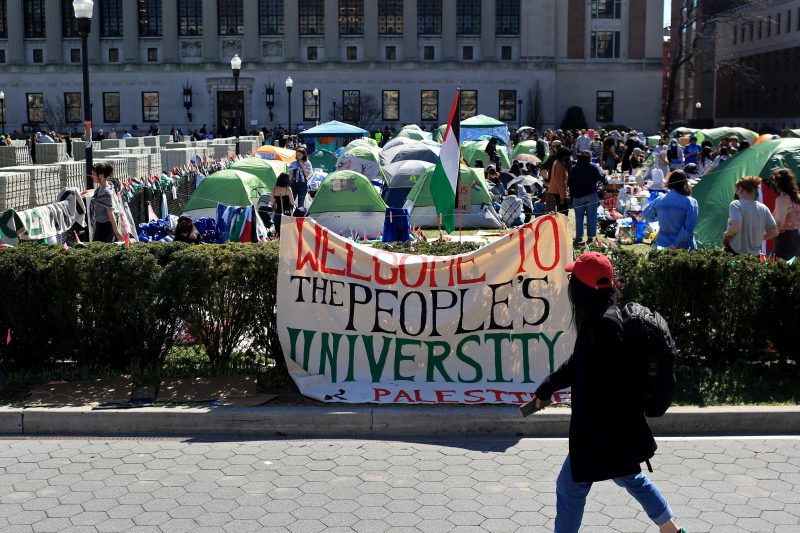The continued fervor of college protests against the Israel-Gaza war as it drags into its seventh month highlights the political challenges President Biden still faces from his unconditional support of Israel as he aims to strike a careful balance between condemning antisemitism on college campuses and supporting students’ right to protest.
Students at several campuses across the country have formed encampments and barricades to pressure their universities to divest from any ties to Israel and to back a permanent cease-fire. But some Biden allies and Democratic strategists noted that the highly charged protests, which have resulted in hundreds of arrests, have largely taken place at elite colleges, and said it remains unclear whether opposition to U.S. support of Israel, especially among younger Democrats, will significantly impact Biden’s electoral prospects.
White House and campaign aides said they were focused on condemning antisemitism and ensuring Jewish students feel safe on campus, while also highlighting anti-Arab discrimination and reaffirming people’s right to protest and address Palestinian suffering. Even as the campus protests have drawn nationwide attention, Biden aides said they did not see them as an escalation from the protests that have taken place since the war began in October. Aides also noted the protests were not directed toward the president personally.
As protests sweep college campuses, Biden’s middle-ground approach reflects, in part, an effort to hold together his disparate coalition of voters, which include young people, communities of color, and independents and moderate Republicans. The president won young voters by huge margins in 2020 and is looking to replicate that in November with voters under 35, especially in swing states. But Biden’s campaign faces a challenge as it seeks to avoid alienating young and progressive voters demanding an end to the war, as well as independent voters and moderate Republicans, many of whom support continued military aid to Israel.
Former president Donald Trump, the presumptive Republican nominee, blasted Biden’s handling of the protests in comments outside the Manhattan courtroom where his trial on allegations of business fraud related to hush money payments is underway. Trump also used the college campus protests to complain about the police presence at his trial, which he falsely said was preventing protesters from being able to convene outside the courthouse.
“He doesn’t know what to do. He wants to take like a middle ground and often times that doesn’t work but it’s certainly not working here,” Trump said in comments outside the courtroom.
In a separate Truth Social post, Trump complained that protesters were not allowed to convene outside his trial. Protesters are allowed to assemble across the street from the courthouse.
“The Palestinian Protests at Columbia University have CLOSED THE COLLEGE DOWN. But the area surrounding the Courthouse, in Downtown Manhattan, is closed up like a drum, with New York City’s Finest (Police) all over the place. Why not send some to Columbia to protect Jewish Students, and others,” Trump wrote. “Republicans want the right to protest in front of the Courthouse, like everyone else!”
University campuses across the country have seen a surge in antiwar demonstrations in recent days, including students moving into tents in protest encampments. Some of these, including at Columbia University on Thursday and New York University on Monday night, were cleared by police called in at the request of the institutions. Dozens were arrested at Yale University on Monday morning, and students barricaded themselves late Monday inside a building at California State Polytechnic University Humboldt. More than 130 protesters were arrested at New York University on Monday night, the New York Police Department told The Washington Post.
So far, Biden has weighed in twice on the protests. On Sunday, in a statement marking the start of Passover, Biden condemned the rise of antisemitism since the Oct. 7 Hamas attack, which killed 1,200 people, many of them civilians, and resulted in about 250 being taken hostage. On Monday, Biden condemned both the antisemitic chants that have taken place on some campuses as well as those who he said do not understand the plight of Palestinians in Gaza.
“I condemn the antisemitic protests. That’s why I have set up a program to deal with that. I also condemn those who don’t understand what’s going on with the Palestinians,” Biden said.
Senior White House aides closely monitored reports of ongoing protests over the weekend, according to a person familiar with the situation, who spoke on the condition of anonymity to discuss internal dynamics. To manage the protests and allegations of discrimination on campus, Biden officials are using tools they developed as part of their National Strategy to Combat Antisemitism, largely through the Department of Education’s Office of Civil Rights.
Israel launched a punishing retaliatory military campaign in Gaza that has killed more than 34,000 Palestinians, according to the Gaza Health Ministry, which says the majority of the dead are women and children. Israel’s siege of the enclave has created a humanitarian catastrophe as Gaza’s health system has collapsed and the enclave faces famine.
Both Democrats and Republicans on Capitol Hill decried the antisemitism they said was percolating on college campuses. Several student groups leading the protests said much of the extreme rhetoric has come not from students, but outside agitators who have made their way onto campuses.
House Republicans were quick to threaten to strip federal funding from universities that they determine do not protect their Jewish students.
“We’re going to call on educational institutions like Columbia, if you cannot control what is happening at your university, if the president at this university is failing to keep students safe, then she shouldn’t be eligible for any federal aid coming into this university,” Rep. Anthony D’Esposito (R-N.Y.) said after touring the campus with fellow GOP freshman Rep. Michael Lawler (N.Y.) on Monday.
House Democrats also descended onto Columbia’s campus Monday to express outrage over antisemitic attacks on Jewish students, including Democratic Reps. Josh Gottheimer (N.J.), Dan Goldman (N.Y.), Jared Moskowitz (Fla.), and Kathy Manning (N.C.). Their pleas were not as forceful as Republicans’, who left no room for equivocation between students targeting Jewish students and those peacefully protesting the war in Gaza. But the Jewish lawmakers were adamant in their demands to protect students with backgrounds like theirs.
Military aid to Israel has divided the Democratic caucus. About half of Senate Democrats signed onto a measure that would condition military aid to Israel. Over the weekend, 37 liberals voted against sending $14 billion in aid to Israel. That package would have included humanitarian aid for Gaza, but lawmakers said they were concerned the aid would never make it to those in need because of the collapse of law and order in the enclave. Liberals have clashed with some Jewish colleagues, prompting Democratic leadership to attempt to keep attacks from becoming personal among colleagues.
Speaking before Biden at an Earth Day event on Monday, Rep. Alexandria Ocasio-Cortez (D-N.Y.) took a moment to praise “the leadership of those peaceful student-led protests on campuses like Columbia, Yale, Berkeley and many others.” It was a notable aside during remarks among young climate activists, given a White House statement Sunday blasting some of the protesters as trafficking in antisemitism.
Biden has made modest gains in polling in recent weeks. His approval rating in a Washington Post average of public polls stands at 40 percent this month, ticking up from 38 percent in January though still below the 43 percent average during his first term. Biden has also pulled even with Trump in a Post average of April national polls measuring head-to-head support for the president; Biden trailed by one to two percentage points since November.
But polls have also shown more Democrats opposing continued military aid to Israel. A CBS News-YouGov poll conducted this month found the share of Democrats saying the United States should send weapons and supplies to Israel dropped from 47 percent in October to 32 percent in April. Separately, a Pew survey in February found 52 percent of Democrats and Democratic-leaning independents said the way Israel is carrying out its response to Hamas’s Oct. 7 attack is unacceptable.
While Biden has grown more critical of Israel in recent months, he has maintained unconditional military support of the country even as he has decried the high civilian casualty and severe lack of humanitarian aid going into Gaza. That support has prompted sustained protests over the last six months that have hampered Biden’s ability to campaign across the country.
John Della Volpe — the director of polling at the Harvard Kennedy School Institute of Politics who advised the Biden campaign in 2020 on young voters — said his poll of voters under 30 found they rank inflation and abortion as much more pressing issues than the Israel-Gaza war.
“There is a disconnect in our minds around what we’re seeing on TV at these college campuses versus what young people feel and think about the conflict and the war and the humanitarian crisis,” he said.
Young voters, he said, are paying attention to the conflict and overwhelmingly support a cease-fire, but they have “far more sympathy” for both the Palestinians and Israelis. He said the poll found young voters ranked the conflict near the bottom of the list of 16 areas of concern.
But Della Volpe cautioned that he was looking at a national sample, and the issue may be salient for young voters in a place like Michigan, which has a large Arab and Muslim population.
As president, Biden has been repeatedly confronted by pro-Palestinian protesters — and he has often sought to avoid them as much as possible. Protesters have interrupted his speeches, placed bloody handprints near the front of the White House and yelled at Biden during a Christmas tree-lighting ceremony during his family vacation in Nantucket, Mass.
They have also gathered at the entrance to his neighborhood in Wilmington, Del., at times causing him to take more circuitous routes to get to his nearby church and other times passing them as they pour fake blood onto the street as his motorcade passes them.
Biden has a long and complicated relationship with protest movements, and has often kept an arm’s length from ones that defined his generation. He did not fight in the Vietnam War, and didn’t participate in the protests that were roiling college campuses at the time, later saying, “I’m not big on flak jackets and tie-dyed shirts and — you know, that’s not me.”
He once recalled walking with law school classmates and seeing antiwar student protesters hanging out of windows after taking over an administrative building, a scene not all that different from the ones of current campuses.
“We looked up and said, ‘Look at those a — holes,’” Biden later wrote. “That’s how far apart from the antiwar movement I was.”
But as he ran for Senate in 1972, he recruited young students, many of them animated by the antiwar movement, and he gave speeches about how the United States should have left Vietnam years earlier.
During the civil rights movement, Biden has recounted participating in some actions in his hometown, but he wasn’t among those in his generation who traveled to the South and joined the Freedom Riders in some of the seminal events of his generation.
“I regret — and although it’s not a part of what I’m supposed to say — I apologize it took me 48 years to get here,” Biden said when, as vice president, he eventually went to Selma, Ala., in 2013. “I should have been here. It’s one of the regrets that I have and many in my generation have.”
But during his 2020 presidential campaign, Biden made major efforts to court Black voters, and sought to tap into the anger and protests in the aftermath of the killing of George Floyd.
Scott Clement, Toluse Olorunnipa and Isaac Arnsdorf contributed to this report.

